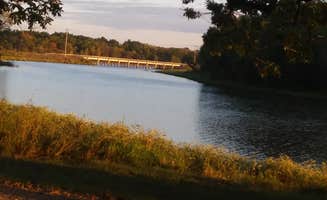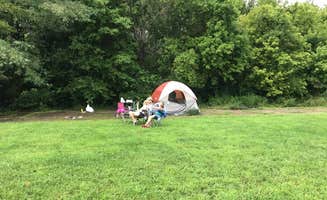Dispersed camping near Kingsville, Missouri centers around several conservation areas with specific camping regulations and access patterns. The region sits approximately 800-900 feet above sea level with open grasslands transitioning to oak-hickory forests. Most camping areas maintain a 14-day maximum stay policy, with sites operating on a first-come, first-served basis except at specific designated locations within the conservation system.
What to do
Arrowhead hunting opportunities: Locals frequently search the shorelines at Montrose Missouri Conservation Area Dispersed Camping for Native American artifacts. One camper noted, "One of the locals stopped by my site to look for arrowheads. Apparently, she has found a lot in the area so that's a good activity if the kids are bored."
Wildlife photography sessions: Morning hours provide optimal lighting conditions for photographing native species. A visitor at Crooked River Conservation Area shared, "Hunting, fishing and other outdoor activities inside the area" make it a prime location for wildlife observation throughout the day.
Lake access planning: Water levels fluctuate seasonally, affecting boat launch access. "Big lake, several sites to choose, good fishing, pit toilets," explains one Montrose camper, though conditions vary with rainfall and drought patterns, potentially creating shallow areas unsuitable for larger watercraft.
What campers like
Privacy between sites: The conservation areas provide ample space between camping locations. At Poague Campsite #5, a camper reported, "This is great secluded spot, right off the highway. Perfect for what I was looking for to car camp."
Overnight accessibility: Many sites remain accessible without advanced planning. Crooked River Conservation Area offers "Free camping in designated camping area per MO Dept of Conservation rules. Pit toilets and mowed area for camping."
Convenient highway proximity: Several conservation areas feature quick access from main roads. "Nice city park campground. Location was nice and quiet with beautiful views of lake," notes a Montrose visitor, highlighting the balance between accessibility and peaceful camping.
What you should know
Pit toilet conditions: Maintenance varies significantly between conservation areas and seasons. "Bathrooms were fine. It's free camping so it was great that there were bathrooms at all," reports one Montrose camper, while others note that "Vault toilets were absolutely disgusting, thankfully we brought our own toilet paper."
Hunting season restrictions: Each conservation area enforces different closure periods. "The sign says NO FISHING after Oct.14 because of duck season. Open for camping," explains one visitor at Poague Campsite #3, but regulations vary by location and year.
Site definition uncertainty: Many areas lack clear boundaries between campsites. At Crooked River Conservation Area, one camper observed, "There is really only one campsite, although there is enough room for probably four campsites, but I arrived when a group had leery spread out over the entire campsite."
Tips for camping with families
Temporary camp improvements: Create temporary fire rings that can be dismantled upon departure. "There some fire spots but be kind an put up rocks that you can find along the shore," advises a Montrose camper, suggesting responsible site modification.
Wildlife education preparation: Pack field guides to identify local species. "There is loads of wildlife to see," notes a visitor to Montrose, making these conservation areas valuable for educational opportunities with children.
Bathroom preparedness: Always travel with personal hygiene supplies. A camper at Poague Campsite #4 recommends bringing toilet paper, sanitizer, and waste bags since facilities may be unavailable or poorly maintained across the conservation network.
Tips from RVers
Site selection timing: Arrive early to secure the limited level spaces. "Large grass area available for tents or campers. No specific camp locations," notes a Montrose visitor, highlighting the importance of arriving when daylight permits proper assessment of ground conditions.
Water access planning: No water hookups exist at any conservation areas. One camper at Montrose explained, "Large grassy area with plenty of room to set up a tent or camper. Right off the road, so no dirt roads to traverse," but reminds visitors that all water must be brought in.
Road condition awareness: Access roads remain usable for most recreational vehicles. "You could definitely get a big rig in and out of here on the looped gravel roads," confirms a Montrose visitor, though seasonal conditions may affect accessibility after heavy rainfall.



